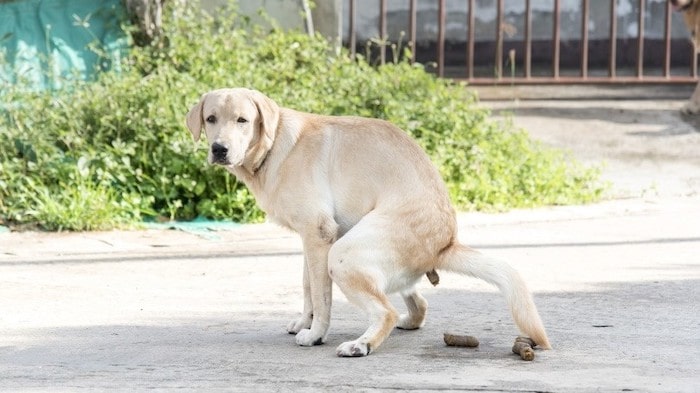Have you ever taken a whiff of your furry friend’s fresh deposit in the backyard and wondered, Why does my dog’s poop smell so bad? It’s a question that many dog owners have pondered, and it’s not just about avoiding an unpleasant odor.

Understanding the reasons behind the foul smell can provide valuable insights into your dog’s health and well-being. In this article, we’ll delve into the intriguing world of canine feces and explore the various factors that contribute to the pungent aroma.
From diet and digestion to underlying health issues, we’ll uncover the secrets behind why your dog’s poop may have an overpowering stench. So, grab a breath mint and let’s dive into the smelly business of understanding why your dog’s poop smells so bad.
Table of Contents
Common Causes of Smelly Dog Poop
There are many factors that can affect the odor of your dog’s poop, such as:
1) Diet: What your dog eats can have a big impact on the smell of their poop. Some foods that can cause smelly poop include low-quality kibble, dairy products, human food, spicy food, garlic, onion, etc.
These foods can either be hard to digest for your dog or contain compounds that produce foul-smelling gases when broken down in the gut.
To avoid this, feed your dog a high-quality, balanced diet that is appropriate for their age, size, and activity level. You can also consult your vet for specific dietary recommendations for your dog.
2) Health conditions: Some health issues that can cause smelly poop include infections, inflammation, allergies, parasites, pancreatitis, liver disease, kidney disease, etc. These conditions can either affect the digestion or absorption of nutrients in your dog’s gut or cause inflammation or bleeding in the intestinal tract.
Some of these conditions can also cause other symptoms such as vomiting, diarrhea, weight loss, lethargy, etc. If you suspect that your dog has a health problem that is causing smelly poop, you should take them to the vet as soon as possible for diagnosis and treatment.

3) Parasites: Parasites are organisms that live in or on your dog and feed on their blood or nutrients. Some common parasites that can infect your dog’s gut and cause smelly poop include worms (such as roundworms, hookworms, tapeworms, etc.), giardia, coccidia, etc.
These parasites can also cause other symptoms such as diarrhea, mucus or blood in the stool, weight loss, poor coat condition, etc.
To prevent and treat parasite infections in your dog, you should deworm them regularly and keep their environment clean and sanitary. You can also ask your vet for specific parasite prevention and treatment options for your dog.
4) Medications: Some medications that your dog may take for various reasons can also affect the smell of their poop. For example, antibiotics can disrupt the balance of bacteria in your dog’s gut and cause smelly poop. Other medications that can cause smelly poop include steroids, anti-inflammatories, painkillers, etc.
These medications can also have other side effects such as stomach upset, diarrhea, constipation, etc. If you notice that your dog’s poop smells worse after taking a medication, you should talk to your vet about adjusting the dosage or switching to a different medication.
When to Worry About Your Dog’s Poop
While some degree of odor is normal and expected in your dog’s poop, there are some signs and indicators that your dog’s poop may be a sign of a serious problem. These include:
1) Blood: Blood in your dog’s poop can indicate bleeding in the lower intestinal tract or rectum. This can be caused by various reasons such as trauma, infection, inflammation, tumors, etc.
Blood in the stool can either be bright red (indicating fresh bleeding) or dark and tarry (indicating old bleeding). Either way, blood in the stool is not normal and should be checked by a vet immediately.
2) Mucus: Mucus in your dog’s poop can indicate inflammation or irritation in the intestinal lining. This can be caused by various reasons such as allergies, infections, parasites, stress, etc.
Mucus in the stool can either be clear or white (indicating mild inflammation) or yellow or green (indicating severe inflammation or infection). Mucus in the stool is not normal and should be checked by a vet as soon as possible.
3) Worms: Worms in your dog’s poop are a clear sign of parasite infection. Worms are usually visible to the naked eye and can vary in size and shape depending on the type of worm.
Some common types of worms that can infect your dog’s gut include roundworms (which look like spaghetti), hookworms (which look like thin threads), tapeworms (which look like rice grains), etc. Worms in the stool are not normal and should be treated by a vet promptly.

4) Diarrhea: Diarrhea is when your dog’s poop is loose or watery and occurs more frequently than usual. Diarrhea can be caused by various reasons such as dietary changes or indiscretion, infections, parasites, stress, etc.
Diarrhea can also lead to dehydration and electrolyte imbalance in your dog, which can be life-threatening if not treated.
If your dog has diarrhea, you should monitor their fluid intake and output, and take them to the vet if the diarrhea persists, is severe, or is accompanied by other symptoms.
5) Constipation: Constipation is when your dog’s poop is hard or dry and occurs less frequently than usual. Constipation can be caused by various reasons such as dehydration, lack of fiber, lack of exercise, obstruction, etc.
Constipation can also lead to discomfort and pain in your dog, and potentially serious complications such as impaction or megacolon if not treated.
If your dog has constipation, you should increase their water and fiber intake, encourage them to exercise more, and take them to the vet if the constipation persists, is severe, or is accompanied by other symptoms.
If you notice any of these signs in your dog’s poop, you should contact your vet as soon as possible for diagnosis and treatment. You should also collect a sample of your dog’s poop and bring it to the vet for analysis. This will help the vet determine the cause and severity of the problem and prescribe the appropriate treatment.
It is also important to have regular check-ups and stool tests for your dog, especially if they are young, old, or have a history of health issues. This will help detect any problems early and prevent them from getting worse.
How to Reduce the Smell of Your Dog’s Poop
While you may not be able to eliminate the smell of your dog’s poop completely, there are some things you can do to make it less smelly. These include:
1) Changing their diet: As mentioned earlier, what your dog eats can have a big impact on the smell of their poop. You may want to try changing their diet to something more digestible and less odorous, such as a high-quality kibble or canned food that is specially formulated for dogs with sensitive stomachs or allergies.
You may also want to avoid feeding them foods that are known to cause smelly poop, such as dairy products, human food, spicy food, garlic, onion, etc.
You should also avoid changing their diet too frequently or abruptly, as this can cause digestive upset and smelly poop. You should always introduce new foods gradually and monitor their reaction.
You can also consult your vet for specific dietary recommendations for your dog based on their age, size, and health condition.
2) Adding supplements: You may also want to add some supplements to your dog’s diet that can help improve their digestion and reduce the odor of their poop. Some examples of supplements that can help with this issue include probiotics, enzymes, fiber, charcoal, etc.
Probiotics are beneficial bacteria that help balance the gut flora and support immune system function. Enzymes are substances that help break down food and enhance nutrient absorption. Fiber is a type of carbohydrate that helps regulate bowel movements and prevent constipation or diarrhea.
Charcoal is a substance that helps absorb toxins and gases in the gut and neutralize odors. You can find these supplements in various forms such as powders, capsules, tablets, chews, etc. You should always follow the dosage instructions on the label or consult your vet before giving any supplements to your dog.
You should also monitor their reaction and stop giving them if they cause any adverse effects such as vomiting, diarrhea, allergic reactions, etc.

3) Using odor-neutralizing products: You may also want to use some products that can help neutralize or mask the odor of your dog’s poop. Some examples of products that can help with this issue include sprays, powders, gels, wipes, etc.
These products contain ingredients such as enzymes, bacteria, essential oils, fragrances, etc. that help break down or cover up the smell of feces. You can find these products in various places such as pet stores, online shops, supermarkets, etc.
You should always follow the usage instructions on the label or consult your vet before using any products on your dog. You should also test them on a small area first to make sure they do not cause any irritation or allergic reactions.
4) Properly disposing of their poop: One of the best ways to reduce the smell of your dog’s poop is to properly dispose of it as soon as possible. You should always pick up your dog’s poop with a biodegradable bag or a scooper and throw it in a trash can or a designated disposal area.
You should never leave your dog’s poop on the ground, as this can attract flies, rodents, and other pests, and pose a health and environmental hazard. You should also clean and sanitize any areas where your dog has pooped, such as your yard, your carpet, your furniture, etc.
You can use products such as bleach, vinegar, baking soda, etc. to disinfect and deodorize these areas. You should also wash your hands thoroughly after handling your dog’s poop or any contaminated items.
FAQ
Are there any home remedies to reduce the odor of my dog’s poop?
While it’s essential to address any underlying health concerns, there are a few home remedies you can try to minimize the odor of your dog’s poop. These include providing a balanced diet, adding digestive enzymes or probiotics to their food, ensuring they have access to fresh water, and maintaining proper hygiene by promptly cleaning up after them. However, it’s always best to consult with your veterinarian for personalized advice.
Can my dog’s diet affect the odor of their poop?
Yes, diet plays a significant role in the odor of your dog’s poop. Certain ingredients, such as high-protein diets or foods with excessive fat content, can result in stronger-smelling feces. Additionally, abrupt changes in diet or feeding your dog table scraps can also impact the odor.
Can my dog’s age or breed affect the smell of their poop?
Yes, factors such as age and breed can influence the smell of your dog’s poop. Older dogs may experience changes in their digestive system, leading to stronger odors. Certain breeds may have a predisposition to certain digestive issues or food sensitivities, which can contribute to smelly poop.
Is it normal for my dog’s poop to have a temporary strong odor?
Yes, occasional variations in odor are normal, especially due to dietary changes or minor digestive disturbances. However, if the strong smell persists or is accompanied by other concerning symptoms, it’s best to consult with a veterinarian to rule out any underlying issues.
Conclusion
In conclusion, your dog’s poop smells bad because of various factors such as diet, health conditions, parasites, medications, etc.
While some degree of odor is normal and expected in your dog’s poop, there are some signs and indicators that your dog’s poop may be a sign of a serious problem, such as blood, mucus, worms, diarrhea, constipation, etc.
If you notice any of these signs in your dog’s poop, you should contact your vet as soon as possible for diagnosis and treatment. You should also have regular check-ups and stool tests for your dog to prevent and detect any problems early.


